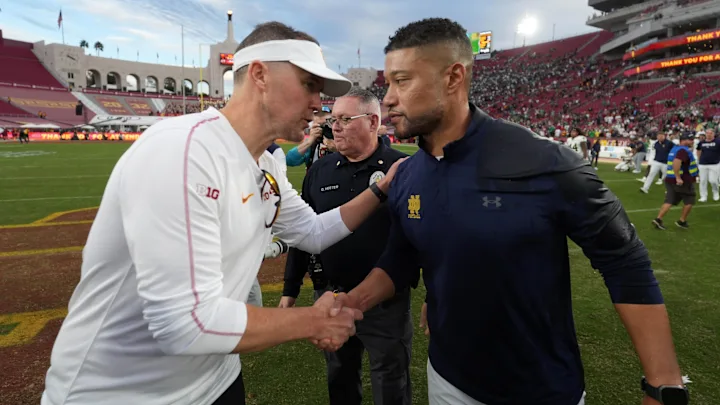The Notre Dame Fighting Irish and the USC Trojans have engaged in one of college football’s most storied rivalries since 1926. Their annual clash, often held on the Saturday following Thanksgiving or in mid-October when played in South Bend, Indiana, has become a tradition cherished by fans of both teams. The winner takes home the Jeweled Shillelagh, a trophy introduced in 1952 that symbolizes the fierce competition and mutual respect between the two programs. As of the 2024 season, Notre Dame leads the all-time series 50–37–5, including a 35–30–3 record in games where the Shillelagh was at stake.
However, this cherished tradition faces uncertainty. The 2025 season is scheduled to be the 96th meeting between the two teams, but beyond that, the future of the rivalry is unclear. USC has not scheduled any games against Notre Dame beyond the 2025 season, and USC Athletic Director Jennifer Cohen has provided an uncertain answer regarding the future of the series. This lack of commitment has raised concerns among fans and alumni who view the rivalry as a cornerstone of college football.
The root of the uncertainty lies in the changing landscape of college athletics. USC’s move to the Big Ten Conference in 2024 has introduced new scheduling complexities. While USC has expressed a desire to continue the annual tradition of playing Notre Dame, the realities of conference play and the pursuit of national championships may influence scheduling decisions. The introduction of the expanded College Football Playoff (CFP) format, which offers significant benefits to conference champions, such as automatic bids and first-round byes, has further complicated the situation. Notre Dame, however, has stated that it is not considering joining a conference despite the expansion of the CFP, emphasizing the value of its independence and the unique opportunities it provides, including scheduling flexibility and maintaining key rivalries.
Both Notre Dame head coach Marcus Freeman and USC head coach Lincoln Riley have expressed a desire to continue the rivalry. Freeman has stated that he loves the rivalry and hopes it continues, acknowledging that every program will do what is best for their conference and playoff chances. Riley, during Big Ten media days, suggested that ending the rivalry might be necessary to focus on national championship goals. This divergence in perspectives highlights the challenges in maintaining traditional rivalries amidst the evolving landscape of college football.
The potential end of the Notre Dame–USC rivalry would mark the conclusion of a significant chapter in college football history. The game has been more than just a contest between two teams; it has been a celebration of college football’s rich traditions, a showcase of elite talent, and a source of pride for fans and alumni alike. The Jeweled Shillelagh, with its emerald-studded shamrocks and ruby-adorned Trojan heads, symbolizes the fierce competition and mutual respect that have defined this rivalry.
As the 2025 season approaches, fans and alumni are left to wonder: will the Notre Dame–USC rivalry continue into the future, or will the 2025 game be the last? The outcome may depend on the willingness of both programs to prioritize tradition over the pressures of conference realignment and playoff aspirations. For now, the 2025 matchup stands as a testament to one of college football’s greatest rivalries, with its future hanging in the balance.



